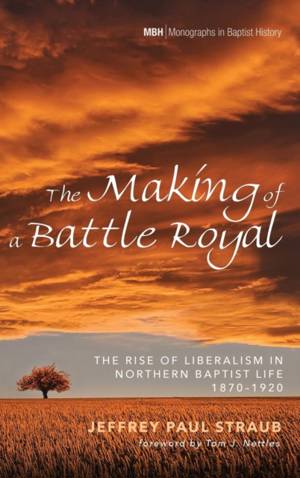
- Afhalen na 1 uur in een winkel met voorraad
- Gratis thuislevering in België vanaf € 30
- Ruim aanbod met 7 miljoen producten
- Afhalen na 1 uur in een winkel met voorraad
- Gratis thuislevering in België vanaf € 30
- Ruim aanbod met 7 miljoen producten
Zoeken
The Making of a Battle Royal
The Rise of Liberalism in Northern Baptist Life, 1870-1920
Jeffrey Paul Straub
€ 106,95
+ 213 punten
Uitvoering
Omschrijving
American Baptists emerged from the Civil War as a divided group. Slavery, landmarkism, and other issues sundered Baptists into regional clusters who held more or less to the same larger doctrinal sentiments. As the century progressed, influences from Europe further altered the landscape. A new way to view the Bible--more human, less divine--began to shape Baptist thought. Moreover, Darwinian evolutionism altered the way religion was studied. Religion, like humanity itself, was progressing. Conservative Baptists--proto fundamentalists--objected to these alterations. Baptist bodies had a new enemy--theological liberalism. The schools were at the center of the story in the earliest days as professors, many of whom studied abroad, returned to the United States with progressive ideas that were passed on to their students. Soon these ideas were being presented at denominational gatherings or published in denomination papers and books. Baptists agitated over the new views, with some professors losing their jobs when they strayed too far from historic Baptists commitments. By 1920, the Northern Baptists, in particular, broke out into an all-out war over theology that came to be called "The Fundamentalist-Modernist" controversy. This is the fifty-year history behind that controversy.
Specificaties
Betrokkenen
- Auteur(s):
- Uitgeverij:
Inhoud
- Aantal bladzijden:
- 414
- Taal:
- Engels
- Reeks:
- Reeksnummer:
- nr. 8
Eigenschappen
- Productcode (EAN):
- 9781498240567
- Verschijningsdatum:
- 17/04/2018
- Uitvoering:
- Hardcover
- Formaat:
- Genaaid
- Afmetingen:
- 152 mm x 229 mm
- Gewicht:
- 721 g

Alleen bij Standaard Boekhandel
+ 213 punten op je klantenkaart van Standaard Boekhandel
Beoordelingen
We publiceren alleen reviews die voldoen aan de voorwaarden voor reviews. Bekijk onze voorwaarden voor reviews.











